Okay, slash shippers. It’s time for an intervention.
It’s okay if a ship doesn’t become canon. The slashtivism needs to stop.
If you’re involved in fandom at all, you know that queer male pairings, or male/male slash ships, are a huge part of the culture. People write fics, draw fanart, and create fanvids about their favorite couples. But the catch is that these male/male pairings involve people—either fictional or real, because, let’s face it, if fic could be converted to energy, then One Direction RPF would power the universe—who aren’t actually together. And probably aren’t ever going to get together.
 There are a few rare exceptions to the general rule that slash ships don’t become canon—and remember, these are ships that fans have culled from an existing narrative about people who are presumed to be “straight,” whether that narrative comes from reality or from a fictional storyline. (People who slashed Lance Bass back in the days of popslash? Congrats, you called that one). But out of the pantheon of major slash pairings, only one or two have ever, in any medium, become “canon.” By definition, being a slasher means being on the outside of canon, and knowing it: it means that you take a canon—the narrative of a story, or of reality, if your slash ship pairing involves real people—and you subvert it by upending the sexuality of the characters presumed to be straight.
There are a few rare exceptions to the general rule that slash ships don’t become canon—and remember, these are ships that fans have culled from an existing narrative about people who are presumed to be “straight,” whether that narrative comes from reality or from a fictional storyline. (People who slashed Lance Bass back in the days of popslash? Congrats, you called that one). But out of the pantheon of major slash pairings, only one or two have ever, in any medium, become “canon.” By definition, being a slasher means being on the outside of canon, and knowing it: it means that you take a canon—the narrative of a story, or of reality, if your slash ship pairing involves real people—and you subvert it by upending the sexuality of the characters presumed to be straight.
This practice is called “slashing,” but it’s more generally thought of as “shipping.” Shipping originates from X-Files fandom, where fans had to wait years and years just for Mulder and Scully to kiss. If you rooted for their relationship, then you “shipped” them. Of course then, as now, what you shipped wasn’t always guaranteed to happen, to become canon—or to stay that way, Chuck/Blair and Rory/Jess shippers. Even if a ship does become canon, you aren’t guaranteed to like it when it happens—I’m looking at you, Buffy/Spike shippers. Not even millions of fans rooting for a fandom pairing guarantees that it will happen—Harry/Hermione, anyone? Of course, if you ship a slash pairing, one that subverts sexuality of characters as they are already established, the odds against your pairing becoming canon are much, much longer.
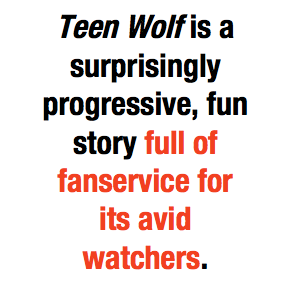 There are all kinds of valid, necessary, important reasons for fans to want and demand queer characters and queer relationships that develop naturally as a part of the storyline—without being shoehorned in, used as a gag or a ratings capture, or a one-off event with no larger impact on the plot or the characters. One would think this would be an easy thing to pull off in this day and age, but a shockingly low number of queer relationships represented in major mainstream narratives fit this description.
There are all kinds of valid, necessary, important reasons for fans to want and demand queer characters and queer relationships that develop naturally as a part of the storyline—without being shoehorned in, used as a gag or a ratings capture, or a one-off event with no larger impact on the plot or the characters. One would think this would be an easy thing to pull off in this day and age, but a shockingly low number of queer relationships represented in major mainstream narratives fit this description.
Instead, we get hamfisted denials of homoerotic subtext (BBC’s Sherlock); open courting of queer subtext with no intention of ever following through (The Sentinel, Xena, The X-Files, Smallville, House, Merlin, White Collar, Hawaii 5-0, Sherlock again); characters being outed outside the narrative (Battlestar Galactica, Harry Potter); and, worst of all, simultaneous denials, open courting, and blatant tongue-in-cheek references to the slash fanbase, all with no intention of following through—a.k.a. Supernatural.
To say this trend creates an upsetting friction between slash fans and creators is putting it mildly.
***
As a longtime slash fan, I have given up on numerous shows because I was frustrated with the way the creative team was handling the amount of gay subtext they were working with. It’s important to note that in each case, I’d only started watching those shows because a major slash fandom had formed around it. (To this day, I don’t know why anyone would watch Stargate: Atlantis except for the gay subtext.) But, ironically, the shows most likely to draw major slash fanbases to them are usually shows whose narratives seem least likely to give slash fans what they want.
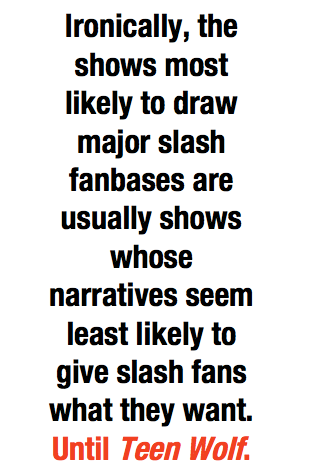 That is, until Teen Wolf.
That is, until Teen Wolf.
It’s hard to overstate the contrast between Teen Wolf and the usual kind of show that attracts a large slash fandom contingent. Boasting a large ensemble cast, lots of diversity, a queer showrunner, and a promise to eventually inject gay relationships into the mix, Teen Wolf is a surprisingly progressive, fun story full of fanservice for its avid watchers.
Perhaps for all the same reasons that it’s not the typical slash fandom fare, Teen Wolf and its fandom are going through something of a mid-life crisis at the moment.
For better or worse, Teen Wolf has grown its success at least partially on the back of a single slash pairing, Sterek (Derek and Stiles). The pairing of Derek and Stiles, two characters who have little actual interaction in the show itself, is so popular that the producers filmed the actors who play the two on a boat as a promo for last year’s Teen Choice awards, encouraging fans to vote for the show. (It won.) (Of course it did.)
Fans have rarely if ever had a showrunner as friendly and open to the concept of slash as Teen Wolf’s Jeff Davis. After Davis tossed out the comment early on that Sterek might happen on the show one day, an ever-growing number of Sterek fans embarked on what has essentially become a public relations campaign for their ship. The Sterek Campaign has been careful to state that it’s not asking Davis to make Sterek a reality. But many other fans have gone further, suggesting that if Sterek doesn’t happen, it would be a betrayal of that early promise, as well as the teasing Sterek promo—which fans took as a good faith bargain.
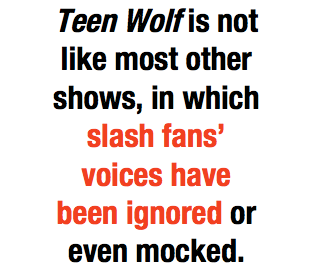 Teen Wolf is not like most other shows, in which slash fans’ voices have been ignored or even mocked. It had gay characters from the start, and that cast has expanded as the show enters its third season. It’s strongly implied that one of its main characters is bisexual, and it has tried to be a progressive show on numerous other fronts as well. Tonight’s episode promises to give fans what they’ve wanted for two and a half seasons—no, what they’ve wanted since slash fandom began back in the 70’s: an actual queer relationship happening onscreen as a non-gratuitous part of the plot.
Teen Wolf is not like most other shows, in which slash fans’ voices have been ignored or even mocked. It had gay characters from the start, and that cast has expanded as the show enters its third season. It’s strongly implied that one of its main characters is bisexual, and it has tried to be a progressive show on numerous other fronts as well. Tonight’s episode promises to give fans what they’ve wanted for two and a half seasons—no, what they’ve wanted since slash fandom began back in the 70’s: an actual queer relationship happening onscreen as a non-gratuitous part of the plot.
There’s just one problem. That queer relationship isn’t Sterek. Instead, one half of Sterek, Derek, is also spending the episode solidifying his romance with his new heterosexual love interest. A depressingly large number of Sterek fans have reacted with extreme misogyny in the face of this development. They’ve dubbed this relationship “jenerek,” because of course she’s just a generic female; they’ve argued extensively that she’s just a female version of Stiles, denying her the privilege of being seen as a character in her own right. Many of them have lashed out, publicly and privately, at members of the fandom who have the gall to be excited about the pairing, or to be cynical about the approach fans are taking to Sterek.
A handful have even declared they’re boycotting the episode—the episode where we finally get a queer relationship, no less—because that relationship isn’t Sterek.
***
This clusterfuck of issues is difficult for me to even cringe past on my dash, much less attempt to unpack, but the main point of conflict seems to involve an extreme redefinition of what “slash” and “shipping” mean. And that makes me very uncomfortable.
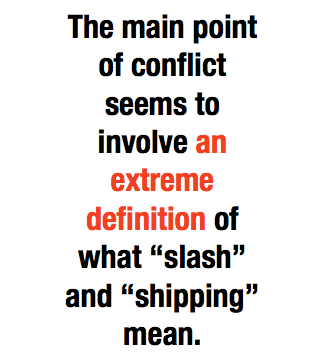 Shipping has traditionally been something that happens by its very nature outside of canon. It’s incredibly easy to forget that in this age of crowdsourcing and fourth-wall-breaking, and that’s fine. We should absolutely want characters to fall in love and have non-heteronormative relationships in the stories we love, and we should always be willing to tell the creators of those stories that we want, deserve, need those things. But while advocating for queer representation is always a political act, shipping is not always political, and it’s not always about queer representation. From where I stand, it seems like fans have seized upon every excuse to demand that Sterek become canon—including arguing that Sterek becoming canon is a political cause.
Shipping has traditionally been something that happens by its very nature outside of canon. It’s incredibly easy to forget that in this age of crowdsourcing and fourth-wall-breaking, and that’s fine. We should absolutely want characters to fall in love and have non-heteronormative relationships in the stories we love, and we should always be willing to tell the creators of those stories that we want, deserve, need those things. But while advocating for queer representation is always a political act, shipping is not always political, and it’s not always about queer representation. From where I stand, it seems like fans have seized upon every excuse to demand that Sterek become canon—including arguing that Sterek becoming canon is a political cause.
Any reason you have to ship something is a valid reason, sure. And any time a creator seems to resist making their world more diverse and reflective of reality, fans should challenge them (and boy, they do), because that shit affects you and me in our real lives. But lack of diversity, lack of queer representation, is not Teen Wolf’s problem. So what reads as some fans as “a political cause” reads to many of the rest of us as “wanting Derek and Stiles to get together because fandom has declared their love to be true.” Don’t get me wrong—I think Sterek is awesome as a marker of what fandom can do and how passionately it can unite around an idea. But to me, all of the interpretation that makes Teen Wolf fans ship Sterek is subjective interpretation. And there is nothing, absolutely nothing, that says it has to become canon. Or that it should become canon.
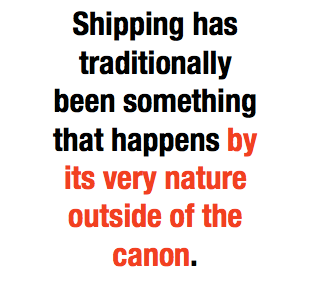 I don’t mean to be harsh, Sterek fans, but just as I once said to myopic authors who thought they could control what fans do with the story they wrote: the story is not defined by the barriers you place around it. And neither are you, as a fan, defined by the barriers canon tries to place around your story. There’s a growing and increasingly pervasive sense that shipping Sterek is about getting to canon—as if canon were an end zone and the only way to ship something is to be a linebacker running a charge for your team. It’s even become habit of late among slash fans to refer to a narrative’s “endgame”—meaning, who’ll be together in the end.
I don’t mean to be harsh, Sterek fans, but just as I once said to myopic authors who thought they could control what fans do with the story they wrote: the story is not defined by the barriers you place around it. And neither are you, as a fan, defined by the barriers canon tries to place around your story. There’s a growing and increasingly pervasive sense that shipping Sterek is about getting to canon—as if canon were an end zone and the only way to ship something is to be a linebacker running a charge for your team. It’s even become habit of late among slash fans to refer to a narrative’s “endgame”—meaning, who’ll be together in the end.
Recently Daily Dot writer Gavia Baker-Whitelaw compared this brand of Sterek shipping to “tinhatting,” the bizarrely obsessive extremist corners of Real Person shipping that have, with the One Direction fandom, become heartbreakingly mainstream. There’s no word in fandom yet for what this approach is, but to me? It’s not slashing. Slashing by its very definition is something that is unlikely to become canon. I think a more accurate word for this manner of shipping is “slashtivism”: prolonged collective agitation for your slash ship to become canon.
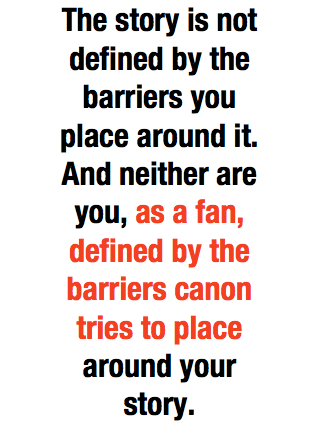 The biggest problem I have with Sterek slashtivism is that it implies that more is at stake if Sterek doesn’t become canon than the hurt feelings of shippers. Ultimately I’m not sure that there is. Davis and the Teen Wolf writing staff clearly, clearly want diversity. They’ve obviously been trying to write storylines that empower all the characters and give the girls awesome story arcs with agency and character depth. They’ve totally given us a gay side character whose role has slowly grown until now, tonight, he’s finally getting his own makeout scene—literally exactly the kind of narrative incorporation slash fans are always dreaming about. Yet Sterek fans are openly discussing how they’re about to stop watching the show, rather than supporting it just as it’s giving them the kind of representation they say they want.
The biggest problem I have with Sterek slashtivism is that it implies that more is at stake if Sterek doesn’t become canon than the hurt feelings of shippers. Ultimately I’m not sure that there is. Davis and the Teen Wolf writing staff clearly, clearly want diversity. They’ve obviously been trying to write storylines that empower all the characters and give the girls awesome story arcs with agency and character depth. They’ve totally given us a gay side character whose role has slowly grown until now, tonight, he’s finally getting his own makeout scene—literally exactly the kind of narrative incorporation slash fans are always dreaming about. Yet Sterek fans are openly discussing how they’re about to stop watching the show, rather than supporting it just as it’s giving them the kind of representation they say they want.
It’s true that, at this point, it will suck if Sterek doesn’t happen. I don’t even ship Sterek, and it will suck for me personally if Sterek doesn’t happen, because not only am I a queer slash fan who wants representation, but I don’t want Davis to have been teasing fans all this time with that boat stunt. I want to know that a major slash pairing can advocate itself into becoming canon because that will shatter like eighteen cultural paradigms at once. (And also, speaking purely selfishly, I don’t want to have endured three years of shirtless werewolves on my dash for no reason.)
Finally, and most importantly, I just don’t want fans to get hurt. I’m used to walking away from shows like Teen Wolf before they can hurt me, before I get invested enough in them to believe that they might offer me the kind of gradually developing romantic storyline I want to see characters fall into. In this sense, above all, slashtivism is unnecessary, and maybe even detrimental. Your ship doesn’t have to be canonical for you to enjoy it. In many cases, fans enjoy their ships less when they finally become canonical. Just ask the Buffy/Spike shippers how their pairing turned out.
So all of you fans who are thinking of walking away from the show before it can disappoint you? Maybe you should. You can ship Sterek without ever watching the show—plenty of people do. It’s a painless exercise, and best of all, it doesn’t keep your hopes up for an indefinite amount of time. Shipping doesn’t require you to watch the show for reasons of inclusivity or diversity, or for anything but Sterek. Shipping is fun, and shipping is contained entirely within the realm of fandom. It doesn’t need Jeff Davis’ approval or seal of authenticity in order to thrive.
But if you’re thinking of walking away from the show because it’s not giving you the “right” queer pairing? Please, please, rethink your priorities. The more people support Danny/Ethan, the more Davis is likely to see Derek/Stiles as something that can feasibly happen on the show.
Slashtivism requires a greater level of awareness than just advocating for your queer relationship to happen. If Sterek not happening overshadows all the progressiveness that Teen Wolf already manifests, you are effectively sending a message to the show’s producers that a non-existent story between two white male side characters is more important to you than the Latino main character of the show, all of its well-developed female characters, and all of its attempts to represent queer characters and experiences.
Don’t let this happen to Teen Wolf. Let Sterek be a ship, not a political crusade.
Illustration by slashpalooza/deviantART


